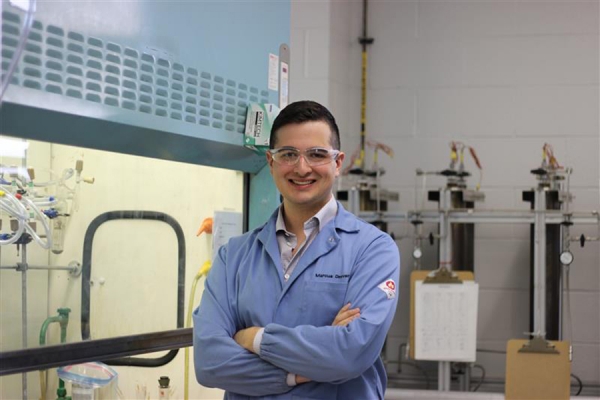 Chemistry professor Marcus Drover is leading a research team exploring ways to turn waste carbon dioxide into fuels.
Chemistry professor Marcus Drover is leading a research team exploring ways to turn waste carbon dioxide into fuels.
Chemistry professor Marcus Drover and his team are flipping the script on carbon dioxide production in their latest research project. They will look at taking an environmentally damaging industry by-product and turning it into an efficient fuel source.
Dr. Drover is the recipient of an Imperial Oil University Research Award for $25,000 for a one-year project called “Oxygenated Fuel Products from Gaseous Carbon Waste Streams.”
Typically when a fuel is burned, it produces the greenhouse gas carbon dioxide as a by-product. Drover intends to use this waste product as a fuel source.
“We are looking to close the carbon cycle by transforming carbon dioxide into fuels or fuel additives, which in turn are combusted to produce more carbon dioxide,” says Drover.
“The strategy isn’t to mitigate carbon dioxide production, it is to close the carbon cycle as we take the greenhouse gas and transform it into something useful, essentially using carbon dioxide as a fuel instead of just having it liberated into the atmosphere and going unused.”
By taking oxygenated fuel products from gaseous carbon waste streams, new petroleum products can be burned to release energy to power a car, a boat, or a generator, says Drover. He adds that the uniqueness of his project comes from how his team is tackling the problem using metal compounds and other tools they have already developed at UWindsor.
“We intend to do this by creating designer metal compounds in the lab, ones that have an affinity for carbon dioxide,” says Drover.
They will use electricity to help convert the carbon dioxide into fuel products.
“By reacting carbon dioxide, the compounds made in our lab, and electricity, we will generate oxygenated fuel products which could be used in downstream applications.
“What sets us apart are the tailor-made molecules we are making to facilitate this process — they are unique to our team.”
Drover says his research program is largely interested in sustainability, green chemistry, and clean energy approaches, all of which align with the Sustainable Development Goals developed by the United Nations.
“The UN put forward goals to bring peace and prosperity for people on the planet and this is something that has helped guide some of our research aims,” says Drover.
“When you think about research, it’s not just about making cool stuff, which we love to do, but also about asking how our work can have lasting societal implications or effects.”
Drover will use the award funds to hire one full-time graduate student and one undergraduate student.
—Sara Elliott
